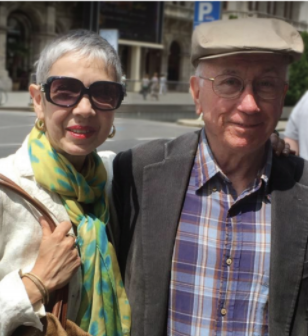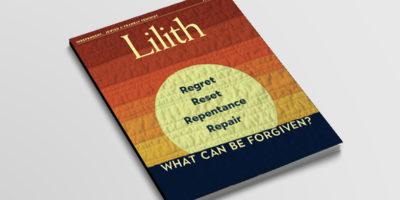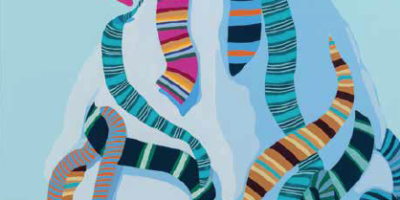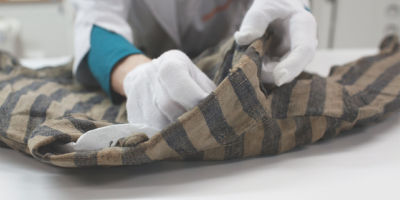
Did Alzheimer’s Turn My Husband Into An anti-Semite?
Plenty of Jews who “marry out” ask their new partners to convert. I wasn’t one of them. Yet I’m deep-in-the-bone and dyed-in-the-wool Jewish. My parents were card carrying Zionists from the Midwest who’d met at Habonim, a Zionist youth group. My father dropped out of the University of Michigan in 1949 to go to the newly formed state of Israel.
“Israel?” said his mother, clearly not keen on the idea. “What’s in Israel? Sand, s—- and flies.”
My mother disagreed. Barely 17, and as starry-eyed with the dream as he was, she followed him there. They lived first in a kibbutz and later on a moshav; my brother was born in the first and I in the second, making me a sabra, with a Hebrew name and Israeli birth certificate. My parents left Israel when I was a year old, but the country loomed large, almost mythical, throughout my childhood, even though I didn’t return until I was 18. When I did, it felt like a homecoming.
But when I fell in love with my husband, it was his very non-Jewishness that made my Jewish girl’s heart flutter. Born and raised in Portsmouth, NH, he was a Yankee through and through, part of a big, extended Catholic family, most of them
still in the area.
The first Christmas we knew each other, he brought me to his boyhood home, a charming white house. He raved about how the backyard had been filled with lilacs in the spring; I could almost imagine their scent. We passed his Nana’s house on State Street, where he’d stop by; together, they did the Jumble in the newspaper while he ate a generous slice of the incomparable apple pie she’d baked. Then there was the Whipple Elementary School, the pond where he’d learned to skate, his father’s sporting goods store on Market Street, where it had been his job to string the tennis racquets and dust the stacked boxes of model airplanes. Molson’s, the drugstore/ luncheonette, was gone, but he wished I’d been able to taste the ice cream Mr. Molson churned in the basement—vanilla, chocolate, peach, and his favorite, coffee.
We drove along the coastline—all 18 miles of it—and he introduced me to his cousin Bobby, who had a lobstering business. As a teenager, he’d worked for Bobby during the summers, and in the years before sunscreen was as much a requisite as toothpaste, he told me his skin burnt as red as those poor lobsters when thrown into pots of boiling water. Further up the coast was where his family would rent a cottage for a few weeks in August; he and his siblings dug for clams along the shore and his mother cooked them in a pot right on the beach. A few years later, as a budding artist, he went there on his own, setting up shop on the boardwalk and drawing portraits of passers-by. We visited the cemetery where his relatives were laid to rest: grandparents, uncles and aunts—most memorably to me the one called Elspeth.
I came back from that visit in love with Portsmouth—and with him. His New England upbringing seemed to have been lifted straight from a Norman Rockwell illustration. Its wholesomeness and its divergence from my own spoke to me. I didn’t need or even want him to be Jewish—I wanted him to be just who and what he was.
The attraction of opposites was reciprocal. If there had been any Jews during the years he lived in Portsmouth, they must have stayed on the sidelines, for he didn’t know them. So, to him, I was an exotic creature—dark-haired, fast-talking, hands
always moving. If his R.P.M. was 16, mine was 78—on a slow day. He loved the Yiddish words I tossed lightly in his direction—gatkes was a particular favorite—and the world they conjured. He could listen to my grandmother’s endless (and endlessly
repeated) stories about the “old country” with true and rapt interest; basking in his attention, she dubbed him “a prince.”
We each fell in love with the way the other was not like us—vive la difference. And it was those differences that carried us happily through our life together. When we married, it was—by mutual agreement—in a civil ceremony, but we celebrated
Pesach and Rosh Hashana with my mother. When our son was born, it was he who urged the bris rather than the purely medical circumcision offered by the obstetrician. I took to his holidays, Easter and most especially Christmas, which I celebrated with all the suppressed longing that only a Jewish girl can have.
We raised our children with a sense of respect for each of our backgrounds; for them, there was no sense of “other” but a strong sense of “both.” I occasionally experienced flack from other Jews who criticized my decision to intermarry, and
especially for not giving our children a more tangible Jewish education. I brushed them off. We were happy. Case closed.
And then, in his seventies, my husband received a diagnosis of Alzheimer’s, a development that changed his life—and mine. As a spouse-turned-caretaker, I struggled with my new role, trying to frame it within the positive. He still knew me, and he still knew the kids. He was still moved—transported even—by the kind of art
he’d always loved. He still took photographs, his life’s work, although he no longer used the Leica that had practically been another limb, or spent hours in the darkroom developing them. He still loved coffee ice cream.
Between my reading and my discussion with his doctors, I knew what to expect: the repetition, the disorientation, the agitation, the sun-downing. I steeled myself against his occasional outbursts, the paranoia and delusions—I was having an affair with the contractor who redid our kitchen, I had tried to poison him, I was stealing his money, I was planning to leave him.
None of this was even remotely true, but reason didn’t have any purchase against the erosion taking place in his mind. I found I could either try to distract him—a phone call to one of our children might help—or wait it out. The moods always
passed, as did his memory of them. “I said that?” he’d ask incredulously. “I didn’t mean it. I’m so sorry.”
But then there was a night on which, in the middle of such an episode, he uttered these words: “You know what the problem is? It’s that you’re a Jew and Jews are a vile people—you’re from a vile race.”
It was the most shocking thing I’d ever heard him say, and for a moment, it seemed to upend everything I thought I knew about him. About us. It was also, in a strange, dark way, kind of…funny. After all, it was a little late to be bringing it up now; the Jewish card had been played early on—from the beginning, in fact.
He went on in this vein for a while and then something in his mood turned; his anger lifted, forgotten. But I couldn’t forget. The other insults, the accusations had been easier to disregard. These words were insidious, heat-seeking missiles aimed right at my heart. What if on some inchoate level, he’d always felt this way? Wasn’t that the old warning? He says he loves you now, but the first time you have a fight, it’ll be dirty Jew. That won’t be us, I had smugly thought. Well, now it seemed that it was.
And that wasn’t the last of it either. On several other occasions, he’d start in on those same accusations, using the same or similar language. Of course I knew that though it was his voice I was hearing, those weren’t his words. They were lines from
a script deeply embedded in our culture and written by the disease, the one that had taken up residence in his brain and was inexorably reshaping it.
But knowing that didn’t entirely diminish their power to wound. Instead, they dredged up every anti-Semitic taunt I’d ever heard: Christ-killer, big nosed, greasy, greedy, money-loving, money-grubbing. Their venom made me question my faith in who we’d been together, and the life we’d made. What if I’d been wrong about all of it, and that there was—and always had been—some deep and yawning chasm between us? What if, as Tom Lehrer had sung back in the 1960’s, “…the Catholics hate the Protestants/the Protestants hate the Catholics/the Hindus hate the Muslims/and everyone hates the Jews”?
Then, for reasons not readily understood, the attacks—at least the anti-Semitic ones—stopped. At the recommendation of his neurologist, his medication was increased, and his moods became less volatile. I learned to see some of the triggers—a touch of impatience in my voice, for instance—and to control them.
We are, for the moment, on safe ground. Or safe enough. He can still laugh at a Yiddish phrase; I’m still the Queen of Christmas. But as has been made clear to me, this disease has only one direction, and that direction is down. I can only hope I’m strong and resilient enough to be remain the loving wife I’ve always tried to be, and the loving caretaker I’ve had to become. Part of that will mean stopping my own ears to the hateful words that can threaten to undo it all.
Yona Zeldis McDonough’s most recent novel is Not Our Kind,
written under the pen name Kitty Zeldis. She’s been Lilith’s
Fiction Editor since 2000.




